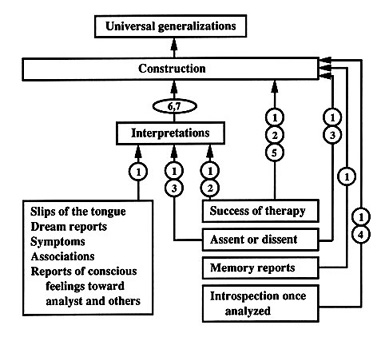Problem 5: Problems with Breuer-Freud Argument
Josef Breuer, Freud's mentor, used hypnosis to revive patients' memories of repressed traumatic experiences. The Breuer-Freud argument is based on the following observation: "each individual hysterical symptom immediately and permanently disappeared when we had succeeded in bringing clearly to light the memory of the event by which it was provoked and in arousing its accompanying affect" (Freud, 1893, p. 6, emphasis in original). Stated more succinctly, this observation forms the following premise to the Breuer-Freud argument:
(1) IF Repression is lifted AND Pent-up emotion is released, THEN Symptom disappears durably.
Since repression lifting and emotional release constitute cathartic treatment, this premise can be shortened to the following:
(1) IF Cathartic treatment, THEN Durable cure.
From this premise Breuer and Freud draw the following conclusion:
(2) THEREFORE, Cathartic treatment CAUSES Durable cure.
The major problem with the inference from (1) to (2) is the possibility that another factor besides cathartic treatment causes the durable cure. Such a possible alternative factor is the placebo effect: that the docile patient, expecting a cure from the wise doctor, is cured by that very expectation.
The figure below (Von Eckardt, 1986) represents epistemological problems in Freud's use of clinical data as discussed by Grünbaum (1984) (circled numbers correspond to numbered problems at left; arrows represent the relation "is considered evidence for").

LEVELS
PROBLEMS
- suggestibility (pp. 130-135);
- failure of tally argument (pp. 135-172);
- weakness of consilience argument (pp. 273-278);
- Nisbett and Wilson findings (pp. 147-148);
- problems with Breuer-Freud argument (pp. 177-189);
- problems with extrapolation to slips and dreams (pp. 190-239);
- problems with establishing causal claims by retrospective testing (pp. 177-189).
References
Freud, S. (1893). Standard edition of the complete psychological works of Sigmund Freud, Vol. 2. J. Strachey (Ed.). London: Hogarth Press.
Grünbaum, A. (1984). The foundations of psychoanalysis: A philosophical critique. Berkeley, CA: University of California Press.
Von Eckardt, B. (1986). Grünbaum's challenge to Freud's logic of argumentation: A reconstruction and an addendum. The Behavioral and Brain Sciences, 9, 262-263.
Last modified January 1999
Visited times since July 2001
Comments?
Home to Psychoanalysis
Home to Great Ideas in Personality
